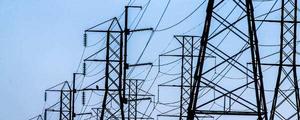PRINCETON, NJ -- Just over half of Americans, 55%, favor the United States' signing a binding treaty in Copenhagen that would commit the U.S. to significantly reducing greenhouse gas emissions, while 38% oppose it. Democratic endorsement of a treaty (79% are in favor) is somewhat higher than Republican resistance (65% are opposed), while independents' views are identical to the national average.
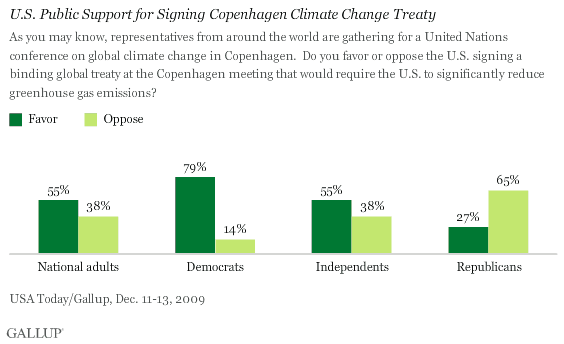
The new findings come from a USA Today/Gallup poll conducted Dec. 11-13.
"Fewer than 4 in 10 Americans (36%) believe that laws designed to reduce global warming will help the economy, while 42% believe those laws will hurt the economy."
Despite this general support for the U.S.' putting pen to paper in Copenhagen, President Obama faces challenges in agreeing to some of the financial and environmental demands being placed on the U.S. at the conference, given U.S. public concerns about the potential economic impact of climate-change policy.
First and foremost, Americans clearly prefer taking major steps to improve the economy over taking major steps to reduce global warming at this time. Eighty-five percent of national adults choose improving the economy in this trade-off, including 93% of Republicans, 85% of independents, and 78% of Democrats.
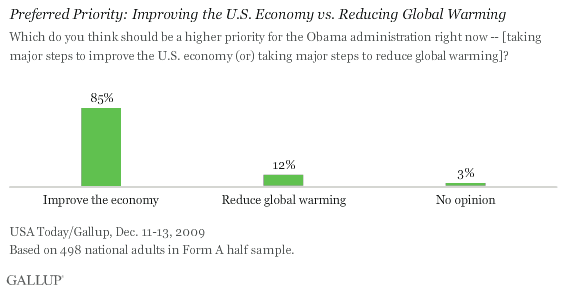
Americans also show more concern for the economy than for the environment in a question designed to test the alarmist arguments on both sides of the issue, but by a much smaller margin than is seen with the priority question. By 46% to 38%, more Americans say the greater risk in developing climate-change policy is the negative economic impact of taking actions to reduce global warming, rather than the negative environmental consequences of not taking those actions, with another 16% unsure.
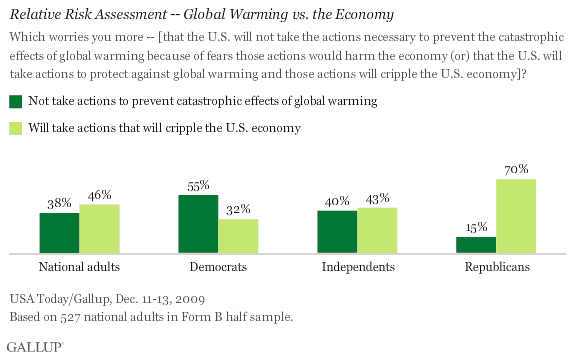
Another question reveals that Obama could have a hard time selling the idea that laws requiring the United States to cap greenhouse gas emissions will ultimately be good for American workers. Specifically, fewer than 4 in 10 Americans (36%) believe that laws designed to reduce global warming will help the economy, while 42% believe those laws will hurt the economy. However, with an additional 17% saying the laws will have no effect on the economy, the majority view is that the economic impact will be no worse than neutral.
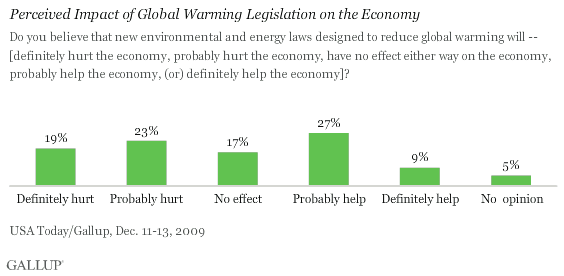
On this question, Republicans are more uniform in their criticism of global warming policies (65% say the new laws would hurt the economy) than Democrats are in those policies' defense (54% say such laws will help).
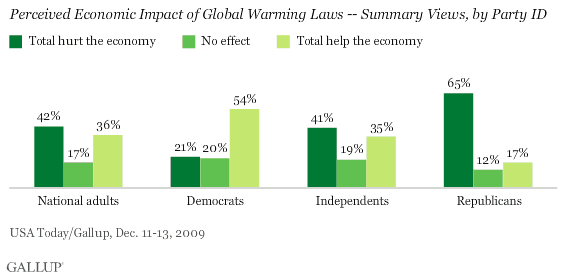
Bottom Line
President Obama has a fine line to walk in Copenhagen -- living up to his long-standing commitment to be a global leader in reducing greenhouse gas emissions while staying mindful of the pitchforks that could be raised at home if he is perceived to be spending too much time on the issue, or selling the U.S. economy down the nearby Gulf Stream.
Americans' general reaction to U.S. participation in a global warming treaty is positive, but their greater relative concern for the economy may help to explain why Obama has yet to agree to the bigger U.S. emissions cuts and funding that much of the world is looking to him for.
Survey Methods
Results are based on telephone interviews with 1,025 national adults, aged 18 and older, conducted Dec. 11-13, 2009. For results based on the total sample of national adults, one can say with 95% confidence that the maximum margin of sampling error is ±4 percentage points.
For results based on the 498 national adults in the Form A half-sample and 527 national adults in the Form B half-sample, the maximum margins of sampling error are ±5 percentage points.
Interviews are conducted with respondents on land-line telephones (for respondents with a land-line telephone) and cellular phones (for respondents who are cell-phone only).
In addition to sampling error, question wording and practical difficulties in conducting surveys can introduce error or bias into the findings of public opinion polls.
